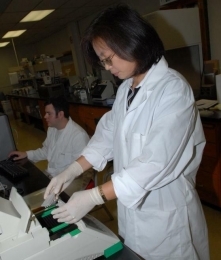
Name
Xiuping Jiang, Ph.D.
Title
Associate Professor
Institution
Clemson University
Education
1996: Ph.D., University of Maryland, Food Microbiology
1987: M.S., Ocean University of China, Food Microbiology
1984: B.S., Ocean University of China, Food Technology
First of all, what brought you to Clemson University?
After my postdoc training in Dr. Mike Doyle’s lab at the University of Georgia, a Food Microbiology faculty position opened up in the Department of Food Science and Human Nutrition, at Clemson University. I applied, and got it. I enjoy working at Clemson, the environment is wonderful.
You learned about the Center for Produce Safety through an email. Why did you decide to apply for funding?
I received a RFP announcement email from CPS. Some of our previous research studies, especially those funded by the Fresh Express Food Safety Initiative and USDA NIFSI, matched CPS’ priority areas. We felt it would take us to the next step in our research. As soon as we received it, we immediately applied.
CPS awarded funding to your project “Environmental effects on the growth or survival of stress-adapted Escherichia coli O157:H7 and Salmonella spp. in compost.” What do you think the industry will gain from your research?
Hopefully, our research will provide the produce industry with some practical guidelines on safe composting under optimal or suboptimal conditions, and control strategies to eliminate pathogen re-growth during compost storage or application.
What are the key factors influencing this field of inquiry?
The microbial ecosystem in compost is very complicated. The interactions of different species of microorganisms, especially food borne pathogens with indigenous microflora, as affected by environmental parameters, are the key factors for the presence and persistence of pathogens. In order to develop strategies for making safe compost useful to the industry, we also need to simulate the composting and storage conditions occurring on farms and develop guidelines for the produce industry.
Where do you see the field of food safety research five years down the road? Why?
Making fresh produce safer will require systematic and multidisciplinary research. We still have a long way to go. There are many steps in the production process. In the 1980s we didn’t see much of Escherichia coli O157:H7 and Listeria and today they are major pathogens. We have already begun to see advances in the types of detection we use. As a result, I hope we will be able to rapidly identify major or new emerging pathogens.
Aside from working in the laboratory, how else do you spend your time?
I spend 25% of my time teaching Food Microbiology to undergraduates and graduate students at the university. I would say that 75% of my time is spent doing research. For the CPS grant we work mainly in the laboratory, but we do go out to our research farm and collect compost. I have two postdoc students, five PhD students, two masters, and several undergrads that are helping me now. When I am not working, I enjoy spending time with my family, traveling, listening to classic music, and playing tennis with my kids, who are ten and fourteen.
Lastly, what would you consider a career highlight?
My current research in compost, addressing the critical step for ensuring fresh produce safe production, is a definite highlight. Being able to work as a tenured faculty in a nice university such as Clemson and researching what I am interested in is one of my career highlights as well.